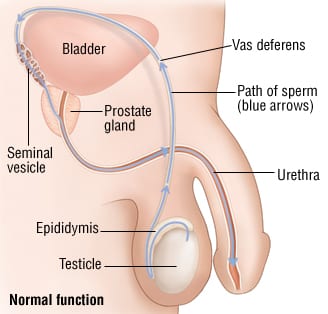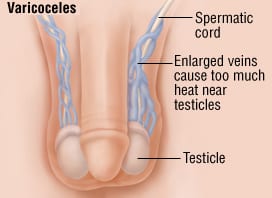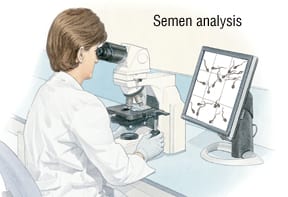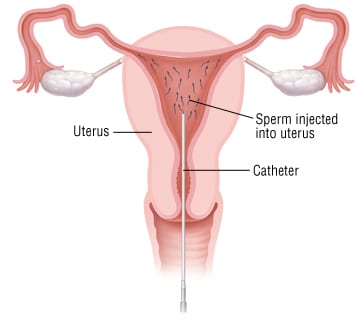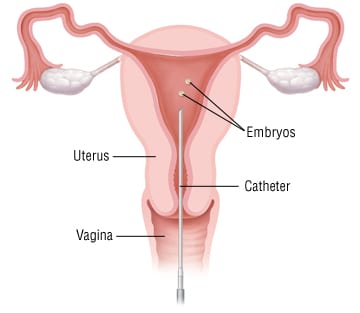Patient Basics: Male Infertility
Originally published by Harvard Health.
What Is It?
Infertility is the inability to achieve a normal pregnancy. About one in seven couples in the United States is unable to conceive a child after trying regularly for one year. Some couples will have success in the second or third year of trying, but couples that cannot conceive after three years are very unlikely to ever succeed unless they seek medical assistance.
Infertility in a couple may be caused by the male partner, the female partner or both. Studies suggest the male partner alone is infertile in about 20% of cases and that both partners have fertility problems about 30% of the time. Therefore, the male partner plays a role in about half of all couples that have difficulty conceiving a child. In about 15% of cases, infertility tests are completely normal in both partners, despite the fact that the couple cannot conceive a child.
Male infertility has a wide variety of causes, which can be broken down into several major groups:
- Hormonal problems, such as low levels of testosterone or thyroid hormone
- Problems with the testicles, including abnormal growth or development, or damage from trauma and infections
- Problems with the flow of sperm within the male reproductive organs, including blocked tubes that transport sperm, genital infections, varicose veins (varicoceles) within the scrotum, or problems with ejaculation
- Abnormal sperm function
- Inherited or chromosomal disorders, including cystic fibrosis and Klinefelter’s syndrome
- Exposure to toxins, such as radiation or industrial chemicals
- Medications and drugs, including psychiatric medications, alcohol, and anabolic steroids used for body building
- General illnesses, including kidney disease, cirrhosis and malnutrition
In up to 50% of infertile men, no specific cause can be identified.
In most cases, infertility is a harmless problem and may respond to treatment. However, about 1% of infertile men have serious medical problems (hormonal problems, infections or tumors) that require medical attention.
Symptoms
Most infertile men will not have any symptoms. A man with hormonal problems may notice a change in his voice or pattern of hair growth, the development of breasts, or difficulty with sexual function.
Diagnosis
When a couple is infertile, the man and woman usually are evaluated together. Even if one partner has previously conceived a child, he or she should be evaluated because a new cause of infertility may have developed.
The evaluation for infertility in men usually begins with a semen analysis, also known as a sperm count. A sample of semen usually is collected in the doctor’s office after the man has abstained from ejaculating for two to three days. If the semen analysis is completely normal, further evaluation rarely is needed.
If the first semen analysis is not normal, one or more additional samples may be collected. If more than one of the samples is abnormal, a more complete evaluation should be done. This evaluation typically includes:
- A complete medical history, including sexual and general development, previous illnesses, medications and exposures
- A general medical examination to look for evidence of hormone problems or underlying medical illnesses — This examination should focus on looking for evidence of genital infections, blocked sperm tubules, and shrinkage of the testicles.
- Testing of hormone levels
Depending on these results, more specialized tests may be necessary, including an ultrasound of the testicles and scrotum, sperm-function testing, genetic tests, or a biopsy of the testicles. Your primary care doctor may be able to begin this evaluation, but you may need to be referred to a specialist (urologist or reproductive endocrinologist).
Expected Duration
In most men, infertility is likely to continue unless it is treated. However, it is important to keep in mind that some couples who have difficulty conceiving in the first year are successful later and that men who appear to have a low sperm count or an otherwise abnormal semen analysis may still be able to father children.
Prevention
Most types of infertility cannot be prevented. Excessive alcohol intake or the use of certain drugs may contribute to infertility and should be avoided in couples hoping to conceive. There is some evidence that high temperatures can make sperm inactive. Although this effect is only temporary, hot tubs and steam baths also should be avoided.
One obvious reason some men are infertile is that they have previously had a vasectomy. Although surgery to reverse this condition may be successful, men who are uncertain about whether they wish to father additional children should not have this procedure.
Treatment
Treatment for male infertility depends on the cause. If a specific reason for infertility is discovered, it sometimes is possible to treat. A variety of treatment options are available and include hormonal therapy, surgery to correct blocked tubes, and treatment of infections or underlying medical conditions.
In some men, no specific cause for infertility can be found, or no treatment options are available to correct the underlying problem. Men who fit this description can now be offered what are known as assisted-reproduction techniques. Some of these techniques are simple, and some are complicated and costly. Which assisted-reproduction technique is used depends on the reasons for infertility and whether the female partner has fertility problems as well:
- In intrauterine insemination, the simplest technique, a semen sample is collected and then treated in a laboratory to improve the likelihood that the sperm can produce a pregnancy. The sperm is then injected into the female partner’s uterus when she is ovulating. This may or may not be accompanied by hormonal treatment of the female partner.
- In in vitro fertilization, eggs are removed surgically from the female partner, combined with sperm in the laboratory, and then surgically replaced in the uterus.
- In intra-cytoplasmic sperm injection, individual sperm are harvested from the testicles and injected into single eggs. Even men with very abnormal sperm production can have success with this technique.
Infertile couples also may wish to explore other options for having children, including artificial insemination with a donor’s semen or adoption.
When To Call A Professional
You may want to talk with your doctor if you and your partner are unable to conceive a child after trying regularly for one year. Older couples or people who have a strong reason to suspect infertility may want to contact their doctors after trying for less time (for example, six months).
Also contact your doctor if you notice a change in sexual function, such as diminished erections or an inability to produce semen.
Prognosis
With improvements in technology, the prognosis for infertile couples has changed from discouraging to quite promising. Up to 50% of men have identifiable or treatable causes of infertility, and assisted reproduction may help many of the rest.
Additional Info
National Institutes of Health (NIH)
31 Center Dr.
Building 1
Room 344
Bethesda, MD 20892-0188
Phone: (301) 496-4000
Fax: (301) 496-0017
http://www.nih.gov/
American Society for Reproductive Medicine
1209 Montgomery Highway
Birmingham, AL 35216-2809
Phone: (205) 978-5000
Fax: (205) 978-5005
http://www.asrm.org/

